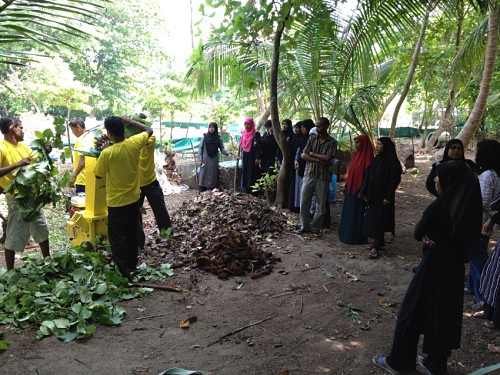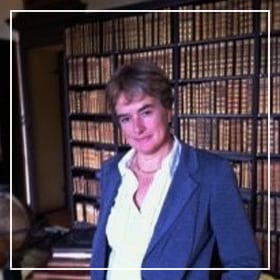Milan. A few meters from Duomo’s Square. Beginning of October. We are under the “Galleria” waiting for Shahida Zubair and Paolo Galli. Paolo is the Director of the Marine Research and High Education Center (MaRHe Center) on Faaf-Magoodhoo (Rep of Maldives); while Shahida is the founder of the company Island Organics Maldives Pvt. Ltd, which pioneered the first Maldivian organic farm on Maarikilu in Baa Atoll. It is a rainy day and we can’t help thinking “how nice would it be to have this meeting on Maarikilu or at the MaRHe Center?”
Shahida came to Milan because she is involved in some exhibitions and projects connected to Expo2015 and we couldn’t miss the opportunity to meet her. Apart from being a real pioneer, Shahida is a crucial contact for the MaRHe Center, in particular on the community-based development research being carried out on Faaf-Magoodhoo. The groundbreaking work of Island Organics is an example of resilience on a local level and we are quite interested in understanding how it could be transformed into a model applicable to other contexts or scales.
Stefano and Marcella: Shahida can you please tell the readers of Allegra why you started this project? We consider you a pioneer so it would be very interesting to know how Island Organics is linked to your personal biography.
Shahida: Well, the island Maarikilu comes with a fair share of history that is very personally related to our family. The lease of Maarikilu was given to my grandmother as a wedding present by her father Sultan Shamsuddin lll and in 1968 leased to my mother. I always felt that something more had to be done with the island. I’m very passionate about growing things, healthy eating, and the environment, which my grandmother instilled in me from an early age. My background is Ecology and Environmental Management; so starting up an organic farm came as a very natural idea.
I’ve always firmly believed in adopting sustainable and environmentally friendly methods of farming, and I am very concerned by how much the Maldives relies on imported goods – not only for the tourism industry, but even for domestic use.
This presents a whole range of issues concerning our carbon footprint, our food security and foreign currency leakage from the country. It is very worrying that most produce, other than coconuts, is almost certainly grown using artificial fertilizers and chemical pesticides, something that I am very concerned about and wish to change. So using my qualifications in Environmental Management and skills learnt at Oxford Brookes University, I established the first organic farm in the Maldives on Maarikilu in Baa Atoll.
As for me being a pioneer…that’s very flattering! But its true that it’s the first time the permacultural system of sustainable organic agriculture integrated with animals is being practiced together with renewable energy such as solar to do it more efficiently!
Stefano and Marcella: Island Organics acts on a number of socio-economic levels: in particular it can be viewed as a concrete (and alternative) model of resilient land use. Could you clarify the social and ecological relevance of this action?
Shahida: Island Organics’ system of agriculture is sustainable crop production intensification (SCPI) through the system of permaculture. This system produces more from the same area of land, while conserving resources because different types of crops are grown on the same area of land. For example passion fruit or gourds are grown on top with lemon grass or chilly peppers or aubergines at the bottom and we use crop rotation and companion planting to mitigate pests. We recycle waste from organic plants and animals on the island and reuse them in the form of compost to grow crops. These local resources form part of the crucial nutrient cycle as composting improves the soil structure, helping to retain moisture and provide nutrients. We aim at enriching the soil and growing healthy crops as a nutrient rich soil produces healthy plants, which are consequentially better able to resist insect and disease attacks; therefore the dependence on chemical pesticides is eliminated. This system has proven over the last eight years to be hugely economic as we do not have to buy any fertiliser or pesticides.
Stefano and Marcella: In 2011 you stated that local communities empowerment could have been a promising outcome of your project. During the last five years both community based economies and gender empowerment have been presented as key priorities of the Maldivian national agenda (we refer for instance to the Fourth Tourism Master Plan). Did you plan to scale up your project and do you think it could be considered a model at a regional or even national scale?
Shahida: Island Organics has greatly contributed towards promoting capacity development and awareness creating programmes through field trips to Maarikilu, especially for women and youth. This was to give them the possibility to see which methods we use to farm organically so that they can learn how to prepare and use biological pesticides instead of chemical pesticides. Island Organics hosted farmers from islands in Baa Atoll such as Kihaadhoo, Dharavandhoo, Kamadhoo, Kudarikilu, Maalhos (which are in the same atoll as Maarikilu). But we also hosted farmers as far away as Haa Alif, Haa Dhaal, Shaviyani (in the northern Region of the archipelago), Fuah Mulaku and Addu Atoll (in the southern region of the archipelago), so not only at a local scale but also on a national scale.
We demonstrated methods of composting so that they can implement it in their home gardens and be self reliant, instead of buying expensive chemical fertilisers. We showed them that crops can be grown organically without the use of harmful chemical pesticides which are harmful to the environment and to themselves.
The majority of the participants were women who were eager to stop using artificial fertilisers and chemical pesticides and start making compost in their home gardens, especially with the realization that it was more beneficial financially and environmentally. These field visits have helped motivate them to start growing food more ecologically.
Island Organics aims to establish a training centre, where we will have training programmes specifically targeted towards Maldivian women and youth. The courses will teach women and youth in the cultivation of organic crops to improve nutrition and ensure household food security to empower them. Our aim is to liaise with the Ministry of Fisheries and Agriculture and other educational institutions both in Maldives and abroad, to offer both theory and practical training to be carried on site, concluding with a qualification from the institutions. This course will be aimed to offer farmers the opportunity to gain skills, knowledge and the techniques to grow crops organically without the use of artificial fertilisers and chemical pesticides to ensure sustainability and reduce impact on global warming. Internships will be offered as an option for trainees with the possibility to stay on and work on the island. This will address the government’s policy to establish training programmes for skills development and vocational education in agriculture and agribusiness to attract young labour force to empower them and provide more opportunities for employment.
Stefano and Marcella: We ourselves work on social response to environmental change in Faaf-Magoodhoo, and we are convinced that if we look at the Maldivian cultural and technological heritage we can find a body of practices and knowledge local communities have developed to cope with environmental challenges. In a certain way we can affirm that isolated communities in the Maldives already are resilient systems. Do you agree? And how do you think your project can reinforce this resilience?
Shahida: That’s absolutely right. If we look at the system farmers used to practice before when there was no possibility of importing fertilisers, we can see they took into consideration the seasonal weather patterns, monsoons and climate change when planting the crops. This allowed crops to grow which are resilient to the prevailing climate conditions and therefore flourish in the weather conditions with little external effort (such as use of chemical fertilisers or over usage of water). This was a very efficient and successful system of agriculture and a variety of crops were grown over the southwest monsoon period; different types of chilly peppers, barley, maize, millet, onion, sweet potatoes etc.
We value and practice the indigenous farming knowledge and experience and then expand on it and grow crops, which are suitable to our climate and water. We also record our experiences and base our selection of crops that are successful and marketable.
We produce organic coconut sugar syrup, which is a delicacy and used in traditional sweet dishes in the islands. The coconut sugar syrup is produced using exactly the same traditional artisanal method used by Maldivians for centuries. This is especially important because it’s a dying out tradition and we are reviving this tradition by training people and inspiring them to keep this tradition alive.
*****************************************
A few weeks before the publication of this interview the Government forced Shahida’s company, Island Organics, off Maarikilu with the justification that they did not win the bid to lease Maarikilu for 21 years. However, Shahida is fighting this decision through the available legal system. Now, Shahida told us Island Organics has the opportunity, earlier than thought, to show that the social and environmental relevance of the project can be replicable in other islands and with other local communities.







A question I have would be this: did the government remove Island Organics as a result of the bidding process, or was it something else? Does resilience run against power interests within the government?